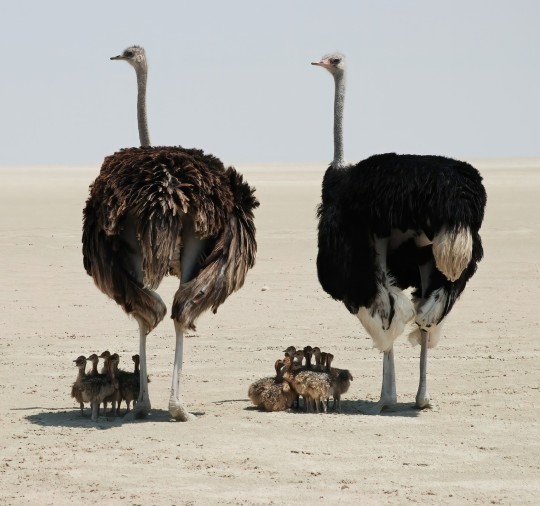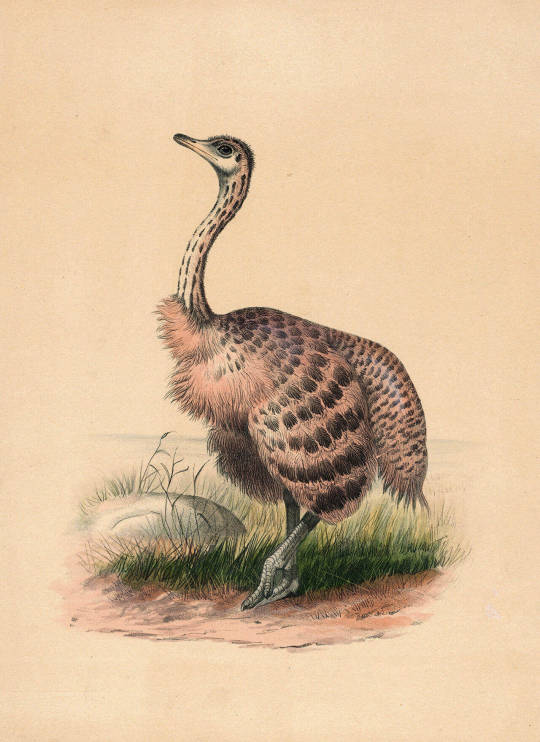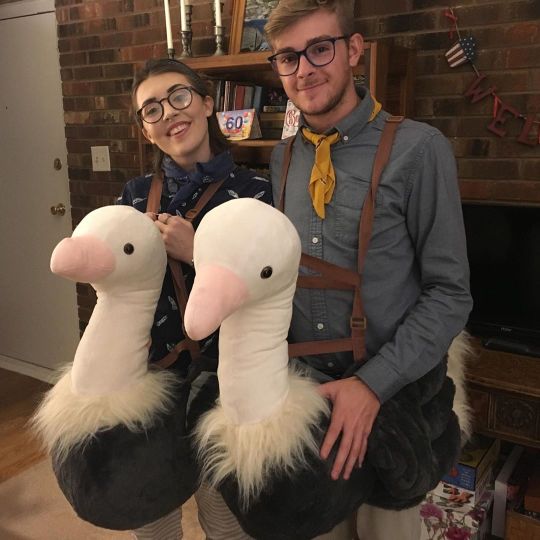#Struthionidae
Explore tagged Tumblr posts
Text

[2621/11080] Common ostrich - Struthio camelus
Order: Struthioniformes Family: Struthionidae (ostriches)
Photo credit: Jaap Velden via Macaulay Library
3K notes
·
View notes
Text

Common Ostriches (Struthio camelus), (L) female and (R) male with chicks, family Struthionidae, Southern Africa
photograph by Elske van der Belden
2K notes
·
View notes
Text

Afrikanischer Strauß | Die Vogel (1913) | Alfred Edmund Brehm (1829-1884) | Biodiversity Heritage Library
4 notes
·
View notes
Text
Common ostrich (Struthio camelus)

46K notes
·
View notes
Text

Strenuous Struthionidae Structure, 2024, acrylic paint on canvas, 12” x 16”. #art #artist #artwork #paint #painting #acrylicpainting #intense #robot #machine #create #creative #unique #strange #bizarre #odd #eyes #eyeball #cyborg #skeleton #frame #structure #abstractart #abstract #abstractpainting #fun #teeth #look #forsale #ostrich #artbrut #outsiderart
#art#fine art#artbrut#outsiderart#acrylic paint#painting#posca pens#abstract art#ostrich#structure#unique#creative#creativity#not ai art#robot art#mechanical art#machinery#automatic art#hand drawn#bizarre art#strange art#odd art#weird#different#art of tumblr#peterdraws
9 notes
·
View notes
Text




142) Struthio molybdophanes; Struś szaroskóry, struś somalijski, Somali ostrich, blue-necked ostrich (struś niebieskoszyi) - gatunek dużego, nielotnego ptaka z rodziny strusi (Struthionidae), wyodrębniony na podstawie testów hybrydyzacji DNA ze strusia czerwonoskórego (Struthio camelus), wcześniej uznawany za jego podgatunek – Struthio camelus molybdophanes.
Struś szaroskóry występuje we wschodniej Afryce na północno-wschodnich terenach Etiopii i Kenii oraz w całej Somalii i Dżibuti. Zasięg jego występowania odpowiada w przybliżeniu obszarowi znanemu jako Róg Afryki.
Międzynarodowa Unia Ochrony Przyrody (IUCN) uznaje strusia szaroskórego za gatunek narażony (VU – Vulnerable). Raport IUCN z 2006 r. wskazuje, że w latach 1970–1980 struś szaroskóry powszechnie występował w środkowych i południowych regionach Somalii. Jednak na skutek politycznego rozpadu tego kraju i braku skutecznej ochrony dzikiej przyrody, zasięg jego występowania i liczebność populacji kurczą się progresywnie. Dodatkowo, w wyniku niekontrolowanych polowań dla mięsa, jaj i produktów leczniczych, gatunek ten staje przed ryzykiem wytępienia w Rogu Afryki.
0 notes
Text
Uncharismatic Fact of the Day
Contrary to what you may see in cartoons, ostriches don’t bury their heads in the sand when frightened. The myth may stem from their nesting habits; parents dig holes in the ground for their eggs, and regularly turn them throughout the day.

(Image: An common ostrich couple (Struthio camelus) by Yva Momatiuk and John Eastcott)
If you like what I do, consider leaving a tip or buying me a kofi!
175 notes
·
View notes
Text
Common ostrich (Struthio camelus)

Can't get over this becayse why did she do thay
8K notes
·
View notes
Photo

Common Ostrich (Struthio camelus)
© Dale Provost
11 notes
·
View notes
Photo

Common Ostrich (Struthio camelus)
© Scott Connop
37 notes
·
View notes
Text

The Black Ostrich, Nouvelles Illustrations de Zoologie (1776) - Peter Brown
#Wonder Rooms#Cabinet of Curiosities#Public Domain#18th Century#Nouvelles Illustrations de Zoologie#Peter Brown#Natural History#Scientific Illustration#Zoology#Ornithology#Animalia#Aves#Struthioniformes#Struthionidae
40 notes
·
View notes
Photo

South African ostrich (Struthio camelus australis)
Photo by Giant Eland
#south african ostrich#ostrich#struthio camelus australis#struthio camelus#struthio#struthionidae#struthioniformes#struthionimorphae#palaeognathae#aves#therapoda#archosauria#sauropsida#reptilia#tetrapoda#vertebrata#chordata
12 notes
·
View notes
Note
BIGGEST BIRDDD please and thank you if not done already :)))))
Oh well we all know who that is...

Somali Ostrich (Struthio molybdophanes), Struthioniodae, order Struthioniformes, Samburu National Reserve, Kenya
Once considered a subspecies of the Common Ostrich, it was elevated to the status of species in 2014.
photograph by Prakash Prabhu

Common Ostriches (Struthio camelus), (L) female and ® male with chicks, family Struthionidae, Southern Africa
photograph by Elske van der Belden

Common Ostrich (Struthio camelus), chicks with female, family Struthionidae, Samburu, Kenya
The chicks from a particular nest will have 1 father, but may have different mothers. Each mother will help raise all of the chicks, once hatched.
The ostrich is the largest bird in the world. It is flightless.
photograph by Charl Stols Photography
278 notes
·
View notes
Text

Struthio | Joseph Wolf (1820-1899)
146 notes
·
View notes
Photo

An Ostrich Researcher and their field assistant 🎃☺️ #BigBirdEnergy #Struthionidae #Ratite #Halloween https://www.instagram.com/p/B4UywEEhqJ5/?igshid=17on2nzzpoj21
1 note
·
View note
Photo


Ostrich and Sarus crane
(with bonus rabbit)
#photography#birds#ostrich#sarus crane#crane#Antigone antigone#Struthio camelus#Struthionidae#Gruidae
2 notes
·
View notes